高中英语教师用书 必修一
- 格式:doc
- 大小:3.16 MB
- 文档页数:90
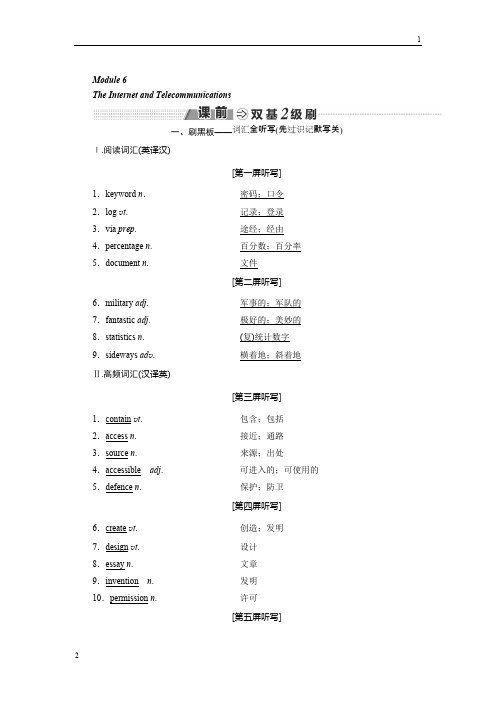
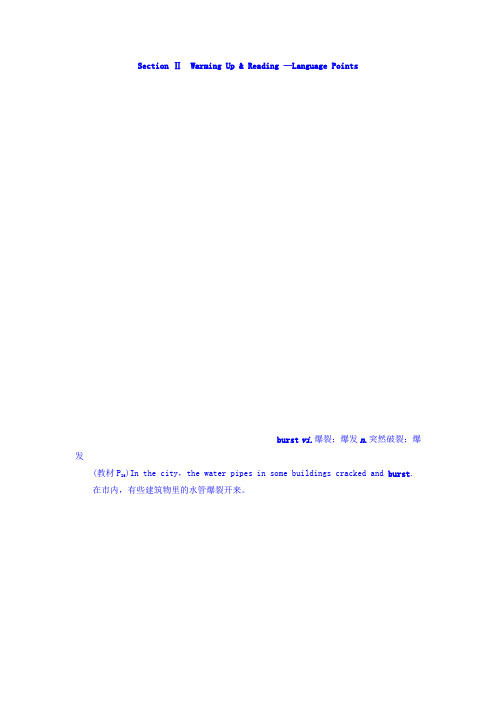
Section ⅡWarming Up & Reading —Language Pointsburst vi.爆裂;爆发n.突然破裂;爆发(教材P26)In the city,the water pipes in some buildings cracked and burst.在市内,有些建筑物里的水管爆裂开来。
(1)⎩⎪⎨⎪⎧burst out crying/laughing burst into tears/laughter 突然哭起来/笑起来burst with anger/joy 勃然大怒/乐不可支(2)burst in/into闯进;突然破门而入①She burst into tears when she learned her failure in the exam.她一听说自己考试不及格就失声大哭。
②The class burst out laughing(laugh).全班突然大笑起来。
③I felt as if my heart would burst with joy.我觉得自己高兴得心花怒放。
爆裂突然(大笑……)冲,闯进,突然出现at an end结束;终结(教材P26)It seemed as if the world was at an end!仿佛到了世界末日!(1)at the end of在……末端 by the end of到……为止(用于完成时) in the end最后;终于 (2) ⎭⎬⎫bring sth.to an end put an end to (使)结束;终结come to an end结束①Only two teams go down in the Chinese Super League at the end of this season. 本赛季末在中超只有两支队伍降级。
②All reports must be sent in by the end of this week.所有的报告必须在本星期以前交齐。
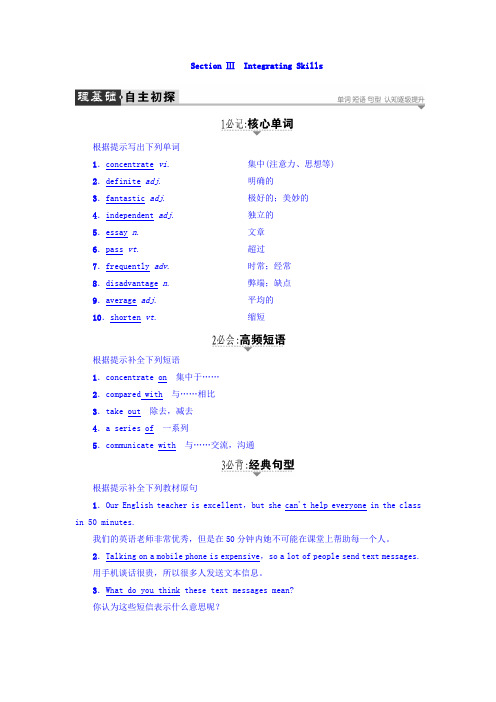
Section ⅢIntegrating Skills根据提示写出下列单词1.concentrate vi. 集中(注意力、思想等)2.definite adj. 明确的3.fantastic adj. 极好的;美妙的4.independent adj. 独立的5.essay n. 文章6.pass vt. 超过7.frequently adv. 时常;经常8.disadvantage n. 弊端;缺点9.average adj. 平均的10.shorten vt. 缩短根据提示补全下列短语1.concentrate on 集中于……2.compared with 与……相比3.take out 除去,减去4.a series of 一系列5.communicate with 与……交流,沟通根据提示补全下列教材原句1.Our English teacher is excellent,but she can't help everyone in the class in 50 minutes.我们的英语老师非常优秀,但是在50分钟内她不可能在课堂上帮助每一个人。
2.Talking on a mobile phone is expensive,so a lot of people send text messages.用手机谈话很贵,所以很多人发送文本信息。
3.What do you think these text messages mean?你认为这些短信表示什么意思呢?阅读P59教材课文,选择最佳答案1.Why do people prefer to use text messages instead of talking on the phones?A.They want to keep secret.B.They want to save money.C.They want to make jokes.D.They want to play word games.2.How can you shorten the words that you use?A.Take out any letters that you use.B.Take out unimportant letters,usually vowels.C.Use numbers instead of words.D.Use words instead of numbers.3.From the passage,we know that .A.it is easy to understand some short messages if you are a ChineseB.it is hard to understand the emoticons if you don't know EnglishC.the short messages cannot be made by ChineseD.short messages sometimes make us puzzled4.The passage is mainly about .A.how to make your phone call cheaperB.text messages and emoticonsC.how to read text messages and emoticonsD.how to shorten your text messages【答案】1-4 BBDBconcentrate vi.集中(注意力、思想等)(教材P54)Concentrate on the good things about the Internet.关注因特网好的方面。
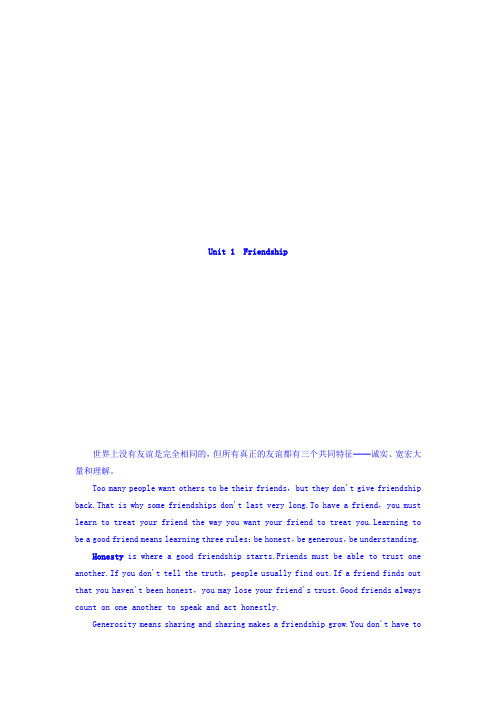
Unit 1 Friendship世界上没有友谊是完全相同的,但所有真正的友谊都有三个共同特征——诚实、宽宏大量和理解。
Too many people want others to be their friends,but they don't give friendship back.That is why some friendships don't last very long.To have a friend,you must learn to treat your friend the way you want your friend to treat you.Learning to be a good friend means learning three rules:be honest,be generous,be understanding.Honesty is where a good friendship starts.Friends must be able to trust one another.If you don't tell the truth,people usually find out.If a friend finds out that you haven't been honest,you may lose your friend's trust.Good friends always count on one another to speak and act honestly.Generosity means sharing and sharing makes a friendship grow.You don't have togive your lunch money or your clothes,of course.Instead you have to learn how to share things you enjoy,like your hobbies and your interests.Naturally you will want to share your ideas and feelings.These can be very valuable to a friend.They tell your friend what is important to you.By sharing them you help your friend know you better.Sooner or later everyone needs understanding and help with a problem. Something may go wrong at school.Talking about the problem can make it easier to solve.Turning to a friend can be a first step in solving the problem.So to be a friend you must listen and understand.You must try to put yourself in your friend's place so you can understand the problem better.No two friendships are ever exactly alike.But all true friendships have three things in common.If you plan to keep your friendships,you must practice honesty,generosity and understanding.1.generous adj.宽宏大量的2.honesty n. 诚实3.hobby n. 爱好4.naturally adv. 自然地5.alike adj.相同的6.have...in common 有……共同点1.Why do some friendships not last very long?______________________________________________________________2.According to the author,how do you help your friend know you better?______________________________________________________________【答案】 1.Because too many people want others to be their friends,but they don't give friendship back.2.Share your ideas and feelings with your friend.Section ⅠWarming Up & Reading —Preparing根据提示写出下列单词1.upset adj.心烦意乱的;不安的;不适的 vt.使不安;使心烦2.ignore vt.不理睬;忽视3.calm vt.& vi.(使)平静;(使)镇定adj.平静的;镇静的;沉着的4.loose adj.松的;松开的5.German adj.德国的;德国人的;德语的 n. 德国人;德语6.series n. 连续;系列7.outdoors adv. 在户外;在野外8.dusk n. 黄昏;傍晚9.thunder vi.打雷;雷鸣n. 雷;雷声根据提示补全下列短语1.add up 合计2.calm(...)down (使)平静下来;(使)镇定下来3.be concerned about 关心;挂念4.go through 经历;经受5.set down 记下;放下;登记6.a series of 一连串的;一系列;一套7.on purpose 故意8.in order to 为了……9.at dusk 在黄昏时刻10.face to face 面对面地根据提示补全下列教材原句1.While walking the dog,you were careless and it got loose and was hit by a car.遛狗时,你不小心把狗松开了,结果狗被一辆汽车撞了。
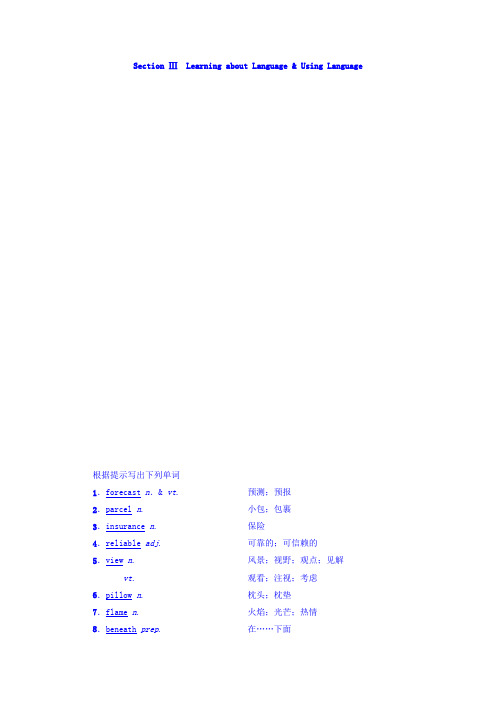
Section ⅢLearning about Language & Using Language根据提示写出下列单词1.forecast n.& vt.预测;预报2.parcel n. 小包;包裹3.insurance n. 保险4.reliable adj.可靠的;可信赖的5.view n. 风景;视野;观点;见解vt.观看;注视;考虑6.pillow n. 枕头;枕垫7.flame n. 火焰;光芒;热情8.beneath prep. 在……下面9.temple n. 庙宇;寺庙10.cave n. 洞穴;地窖根据提示补全下列短语1.as usual 照常2.at midnight 在午夜3.get changed 换衣服4.give up 放弃;停止5.feel like 感觉像……6.stay awake 醒着7.put up 举起;张贴;建造8.be dressed in 穿着根据提示补全下列教材原句1.A determined person always tries to finish the job,no matter how hard it is.不管困难有多大,一个有决心的人总是尽力完成工作。
2.At one point we were so high that we found ourselves cycling through clouds.到了某一点我们的位置太高了,我们发现我们正在云里骑车。
3.We can hardly wait to see them!我们迫不及待地想要见到他们!阅读P22教材课文,选择最佳答案1.Where will they meet their cousins?A.Qinghai. B.Tibet.C.Dali. D.Kunming.2.“We can hardly wait to see them!”means.A.we really don't want to see themB.we can hardly see themC.we want to see them eagerlyD.we can easily see them3.The children dressed in long wool coats stopped to look at Wang Wei and Wang Kun because .A.they were strangersB.they looked like snowmenC.they rode bicyclesD.their legs were heavy and cold4.The writer said,“...we found ourselves cycling through clouds.”He meant .A.they were at a very high altitudeB.the clouds were very lowC.they could see cloudsD.there were many clouds in Tibet5.What did the writer and his sister NOT see along the Mekong?A.Colourful butterflies.B.Clouds cycling around them.C.Many yaks and sheep.D.Flowers on the green grass.【答案】1-5 CCBADas usual照常(教材P22)Wang Wei rode in front of me as usual.像往常一样,王薇在我的前面骑。

Unit 1School life【美文阅读】School years in different countries当你正在享受假期的时候,世界上有些国家的孩子却还在学校里学习。
由于地域、文化、时区的差异,在世界上不同的国家,学校里的学制、假期及课程安排等也形式各异。
Somewhere in the world, right now, students are hard at work in school and some are enjoying holidays. With over 190 nations across the globe's 24 time zones(时区), there are different types of school year. Here's a brief introduction to the typical school year in the following three countries.AustraliaStudents in Australia attend school for 200 days a year. Their school year lasts from late January to late November. Since Australia is in the Southern Hemisphere(半球), it experiences summer while it's winter in China. Summer vacation for Australian students is from December to late January. The school year in Australia is divided into four terms, with each term lasting 9 to 11 weeks. Students then have two weeks of vacation between each term. The typical school day is from 9 a.m. to 3:30 p.m., and lunch is eaten at school. Students are required to attend school for at least nine years.FranceThe school day in France typically runs from 8 a.m. to 4 p.m., with a half day on Saturday. Lunch is a two-hour break for public school students. Students usually attend school from the age of 6 to 18. The school year lasts from August to June, and is divided into four seven-week terms. Students in the primary grades learn basic skills in reading, writing, and math, as well as participate(参与) in exercises to develop observation,imagination, and physical abilities. Older students study French, math, physical and natural sciences, foreign language, history, etc.JapanMost Japanese schools run on a trimester(三学期制) schedule. The school year begins in April and ends in the following March, with summer, winter and spring holidays to separate the three terms. Uniforms are required and there are many rules for hairstyles, shoes, socks, skirt length, etc. Students in Japan study academic subjects, such as Japanese language, math, reading, social studies, and they also receive moral(道德的) education. Moral education involves teaching students about health and safety, understanding and confidence, public manners, and environmental awareness.From:http://www.factmonster. com【诱思导学】1.What is the difference between our school year and theirs?【答案】We have different terms. There are usually two terms in our school year while in both Australia and France, they have four terms and Japan has three.2.Do you think our present school year is good or not, and why?【答案】It is hard to say good or bad because different countries lie in different time zones, they enjoy different holidays and different schools.3.Do you want to know the school life in the UK?Why or why not?【答案】Yes. Because the school life in the UK interests me very much./No. Because I have no interest in the school life there. It's none of my business.Period ⅠPreviewing(教师用书独具)●教学目标本课时主要是通过学生对学案所给出的内容的学习,了解本课文中所出现的词汇,初步了解课文以及相关的背景知识,对下一堂课课文的全面理解起到一个铺垫作用。
人教版高中英语必修一课文必修一 Unit oneAnne’s Best FriendDo you want a friend whom you could tell everything to, like your deepest feelings and thoughts? Or are you afraid that your friend would laugh at you, or would not understand what you are going through? Anne Frank wanted the first kind, so she made her diary her best friend.Anne lived in Amsterdam in the Netherlands during World War Ⅱ. Her family was Jewish so they had to hide oe they would be caught by the German Nazis.S he and her family hid away for nearly twenty-five months before they were discovered. During that time the only true friend was her diary. She said, ”I don’t want to set down a series of facts in a diary as most people do, but I want this diary itselfto be my friend, and I shall call my friend Kitty.” Now read how she felt after being in the hiding place since July 1942.Thursday 15th June, 1944Dear Kitty,I wonder if it’s because I haven’t been able to be outdoors for so long that I’ve grown so crazy about everything to do with nature.I can well remember that there was a time when a deep blue sky, the song of the birds, moonlight and flowers could never have kept me spellbound. That’s changed since I was here.…For example, one evening when it was so warm, I stayed awake on purpose until half past eleven in order to have a good look at the moon by my self. But as the moon gave far too much light, I didn’t dare open a window. Another time five months ago, I happened to be upstairs at dusk when the window was open. I didn’t go downstairs until the window bad to be shut. The dark, rainy evening, the wind, the thundering clouds held me entirely in their power; it was thefirst time in a year and a half that I’d seen the night face to face……Sadly …I am only able to look at na ture through dirty curtains hanging before very dusty windows. It’s no pleasure looking through these any longer because nature is one thing that really must be experienced.Yours,AnneUnit twoThe Road to Modern EnglishAt the end of the 16th century, about five to seven million people spoke English. Nearly all of them lived in England. Later in the next century, people from England made voyages to conquer other parts of the world, and because of that, English began to be spoken in many other countries. Today, more people speak English as their first, second or a foreign language than ever before.Native English speakers can understand each other even if they don’t speak the same kind of English. Look at this example:British Betty: Would you like to see my flat?American Amy: Yes. I’d like to come up to your apartment.So why has English changed over time? Actually all languages change and develop when cultures meet and communicate with each other. Atfist the English spoken in England between about AD 450 and 1150 was very different from the English spoken today. It was based more on German than the English we speak at present. Then gradually between about AD 500 and 1150, English became less like German because those who ruled England spoke first Danish and later French. These new settlers enriched the English language and especially its vocabulary. So by the 1600’s Shakespeare was able to make use of a wider vocabulary than ever before. In 1620 some British settlers moved to America. Later in the 18th century some British people were taken to Australia to. English began to be spoken in both countries.Finally by the 19th century the language was settled. At that time two big changes in English spelling happened: first Samuel Johnson wrote his dictionary and later Noah Webster wrote The American Dictionary of the English language. The latter gave a separateidentity to American English spelling.English now is also spoken as a foreign or second language in South Asia. For example, India has a very large number of fluent English speakers because Britain ruled India from 1765 to 1947. During thattime English became the language for government and education.English is also spoken in Singapore and M alaysia and countries in Africa such as South Africa. Today the number of people learning English in China is increasing rapidly. In fact, China may have the largest number of English learners. Will Chinese English develop its own identity? Only time will tell.STANDARD ENGLISH AND DIALECTSWhat is standard English? Is it spoken in Britain, the US, Canada, Australia, India and New Zealand? Believe it or not, there is no such thing as standard English. Many people believe the English spoken on TV and the radio is standard English. This is because in the early days of radio, those who reported the news were expected to speak excellent English. However,on TV and the radio you will hear differences in the way people speak.When people use words and expressions different from the “standard language”,it is called a dialect. American English has many dialects, especially the midwestern, southern, African American and Spanish dialects. Even in some parts of the USA, two people from neighbouring towns speak a little differently. American English has so manydialects because people have come from all over the world.Geography also plays a part in making dialects. Some people wholive in the mountains of the eastern USA speak with an older kind of English dialect. When Americans moved from one place to another, they took their dialects with them. So people from the mountains in the southeastern USA speak with almost the same dialect as people in the northwestern USA. The USA is a large country in which many different dialects are spoken. Although many Americans move a lot, they still recognize and understand each other's dialects.Unit three Journey Down the MekongPART 1 THE DREAM AND THE PLANMy name is Wang Kun. Ever since middle school, my sister Wang Weiand I have dreamed about taking a great bike trip. Two years ago she bought an expensive mountain bike and then she persuaded me to buy one. Last year, she visited our cousins, Dao Wei and Yu Hang at their college if Kunming. They are Dai and grew up in western Yunnan Province near the Lancang River, the Chinese part of the river thatis called the Mekong River in other countries. Wang Wei soon got timeinterested in cycling too. After graduating from college, we finally got the chance to take a bike trip. I asked my sister, “Where are we going?” It was my sister who first had the idea to cycle along the entire Mekong River from where it begins to where it ends. Now she is planning our schedule for the trip.I am fond of my sister but she has one serious shortcoming. She can be really stubborn. Although she didn’t know the best way of getting to places, she insisted that she organize the trip properly. Now I know that the proper way is a lways her way. I kept asking her, “When are we leaving and when are we coming back?” I asked her whether she had looked at a map yet. Of course she hadn’t; my sister doesn’t care about details. So I told her that the source of the Mekong is in Qinghai Province. She gave me a determined look -- the kind that said she would not change her mind. When I told her that our journey would begin at an altitude of more than 5,000 meters, she seemed to be excited about it. When I told her the air would be hard to breathe and it would be very cold, she said it would be an interesting experience. I know my sister well. Once she has made up her mind, nothing can change it. Finally, I had to give in.Several months before our trip, Wang Wei and I went to the library. We found a large atlas with good maps that showed details of world geography. From the atlas we could see that the Mekong River beginsin a glacier to move quickly. It becomes rapids as it passes through deep valleys, traveling across western Yunnan Province. Sometimes the river becomes a water fall and enters wide valleys. We were both surprised to learn that half of the river is in China. After it leaves China and high altitude, the Mekong becomes wide, brown and warm. As it enters Southeast Asia, its pace slows. It makes wide bends or meanders through low valleys to the plains where rice grows. At last, the river delta enters the South China Sea.JOUENEY DOWN THE MEKONG Part2 A Night in the MountainsAlthough it was autumn,the snow was already beginning to fall in Tibet (西藏).Our legs were so heavy and cold that they felt like bigpieces of ice.Have you ever seen snowmen ride bicylces? That’s what we looked like! Along the way children dressed in long wool coats stopped to look at us. In the late afternoon we found it was so cold that our water bottles froze .However, the lakes shone like glass in the setting sun and loooked wonderful.Wang Wei rode in front of me as usual. She is very reliable and I and I knew I didn’t need to encourage her.To climb the mountains was hard work but as we lookedaround us, we were surprised by the view. We seemed to be able to seefor miles.At one point we were so high that we found ourselvescycling through clouds.Then we began going downthe hills. It wasgreat fun especially as it slowly became much warmer.In the valleyscolourful butterflies flew around us and we saw many yaks and sheepeating green grass.At this point we had to change our caps,coats,gloves and trousers for T-shirts and shorts.In the early evening we always stop to make camp.We put up ourtent and then we eat.After supper Wang Wei put her head down on he rpillow and went to sleep but I stayed awake.At midnight the skybecame clearer and the stars grew brighter.It was so quiet.There wasalmost no wind-only the flames of our fire for company.As I laybeneath the stars I thought about how far we had already travelled.We will reach Dali in Yunan Province soon, where our cousinsDaoWei and Yu Hang will join us. We can hardly wait to see them!Unit fourA Night the Earth didn’t SleepStrange things were happening in the countryside of northeast Hebei.For three days the water in the village wells rose and fell, rose andfell. Farmers noticed that the well walls had deep cracks in them. Asmelly gas came out of the cracks. In the farmyards, the chickens andeven the pigs were too nervous to eat. Mice ran out of the fieldslooking for places to hide. Fish jumped out of their bowls and ponds.At about 3:00 am on July 28, 1976, some people saw bright lights inthe sky. The sound of planes could be heard outside the city ofTangshan even when no planes were in the sky. In the city, the waterpipes in some buildings cracked and burst. But the one million peopleof the city, who thought little of these events, were asleep as usualthe night.At 3:42 am everything began to shake. It seemed as if the world wasat an end! Eleven kilometers directly below the city the greatestearthquake of the 20th century had begun. It was felt in Beijing,which is more than two hundred kilometers away. One-third of thenation felt it. A huge crack that was eight kilometers long andthirty meters wide cut across houses, roads and canals. Steam burstfrom holes in the ground. Hard hills of rock became rivers of dirt.In fifteen terrible seconds a large city lay in ruins. The sufferingof the people was extreme. Two-thirds of them died or were injuredduring the earthquake. Thousands of families were killed of injured reached more than 400,000.But how could the survivors believe it was natural? Everywhere they looked nearly every thing was destroyed. All of the city’s hospitals, 75% of its factories and buildings and 90% of its homes were gone. Bricks covered the ground like red autumn leaves. No wind, however, could blow them away. Two dams fell and most of the bridges also fell or were not safe for traveling. The railway tracks were now useless pieces of steel. Tens of thousands of cows would never give milk again. Half a million pigs and millions of chickens were dead. Sand now filled the wells instead of water. People were shocked. Then,later that afternoon, another big quake which was almost as strong as the first one shook Tangshan. Some of the rescue workers and doctors were trapped under the ruins. More buildings fell down. Water, food, and electricity were hard to get. People began to wonder how long the disaster would last.All hope was not lost. Soon after the quakes, the army sent 150,000 soldiers of thousands of people were helped. The army organized teams to dig out those who were trapped and to bury the dead. To the northof the city, most of the 10,000 miners were rescued from the coal mines there. Workers built shelters for survivors whose homes had been destroyed. Fresh water was taken to the city by train, truck and plane. Slowly, the city began to breathe again.译文:地球的一个不眠之夜河北省东北部的农村不断有些怪事发生:三天来,村子里的井水升升降降,起起伏伏。
Module 5 A Lesson in a Lab一、刷黑板——词汇全听写(先过识记默写关)Ⅰ.阅读词汇(英译汉)[第一屏听写]1.liquid n.液体2.contract v i. 收缩3.substance n. 物质4.oxygen n. 氧气5.rust v i. 生锈[第二屏听写]6.partial adj.部分的;局部的7.steam n. 蒸汽;水汽8.flame n. 火焰9.potassium n. 钾10.sodium n. 钠[第三屏听写]11.calcium n.钙12.magnesium n. 镁13.aluminium n. 铝14.zinc n. 锌15.copper n. 铜[第四屏听写]16.oxide n.氧化物17.dissolve v i. 溶解;分解;分离18.crucible n. 坩埚19.tongs n. (复)夹子;小钳子Ⅱ.高频词汇(汉译英)[第五屏听写]1.expand v i.膨胀2.mixture n. 混合物3.electricity n.电4.stage n. 阶段;时期5.conclusion n. 结论[第六屏听写]6.aim n.目标;目的7.reaction n. 反应8.electrical adj. 与电有关的;用电的9.equipment n. 设备;装备10.react v i. (化学)反应[第七屏听写] 11.ordinary adj.普通的;平常的12.form v i. 形成13.balance n. 天平14.lecture n. 演讲15.department n. (大学的)科、系[第八屏听写] 16.astonished adj.吃惊的;惊愕的17.float v i. 漂浮18.facility n. (常作复数)设备;工具19.boil v t. 煮;煮沸20.add_..._to_... 往……加入……[第九屏听写]21.used_to过去(常常)22.in_the_area_of 在……领域23.be_proud_of 为……感到骄傲/自豪24.be_supposed_to 应当;理应二、刷清单——热身自盘点(再过基本应用关) (一)核心单词(二)常用短语(三)经典句式(四)初中考点再回顾一、过重点单词——纵引横联超人一点1.aim n .目标;目的(可数名词);瞄准,对准(不可数名词)v .瞄准,对准;目标在于;以……为目标[高考佳句] She started the Ladybug Foundation, an organization aiming at getting rid of homelessness.(2017·北京高考)她创办了小瓢虫基金会,一个旨在消除无家可归的组织。
Unit 2Growing pains【美文阅读】我们时常回忆起孩提时代的种种趣事,由于那时我们无忧无虑。
但你是否能够想起青春期时的冲突心理……You must have heard these words like how happy it is to be a child. But would you honestly change places with a child? Think of the years at school. The years spent living in continual fear of examinations and school reports. Every movement you made, every thought you thought was observed(评述)by some adults. Think of the times you had to go to bed early, you had to eat hateful thing that was supposed to be good for you. Remember how “gentle” pressure was given to you with words like “If you don't do as I say, I will...” I'm sure you will never forget!Even so, these are only part of children's trouble. No matter how kind and loving parents may be, children often suffer from some terrible and illogical(不合理的)fears since they can't understand the world around them. They often have such fear in the dark or in the dreams. Adults can share their fears with other adults while children have to face their fears alone.But the most painful part of childhood is a periodwhen you begin to go out of it, the period when you go into adolescence(青春期). Teenagers start to be against their parents and this causes them great unhappiness. There is a complete lack of self-confidence during this time. Adolescents pay much attention to their appearance and the impression(印象) they make on others. They feel shy, awkward and clumsy(笨拙的).Feelings are strong and hearts easily broken. Teenagers experience moments of great happiness or black despair(无望). And through this period, adults seem to be unkind than ever.【诱思导学】1.Do you have the same problems mentioned(提到,涉及到) above now? What do you think is the biggest problem?2.How will you solve the problem without being against your parents?【答案】 1.Yes. Too much homework./ Too much pressure from my school or parents./ Lack ofself-confidence....2.Try my best to be patient./Try to keep calm./Try to understand them./Try to avoid them.Period ⅠPreviewing(老师用书独具)●教学目标本课时主要是通过同学对学案所给出的内容的学习,了解本课文中所毁灭的词汇,初步了解课文以及相关的学问,对下一堂课课文的全面理解起到一个铺垫作用。
一:2019人教版新版高中英语课本介绍新版2019人教版新版高中英语课本共有10本,一般学校只学习前7本即可,一般一个学期1-2本,具体可以参考每个学校的教学计划,一般高三上学期一定会全部学完。
十本课本依次是:新版2019人教版新版高中英语课本必修一新版2019人教版新版高中英语课本必修二新版2019人教版新版高中英语课本必修三新版2019人教版新版高中英语课本选择性必修一新版2019人教版新版高中英语课本选择性必修二新版2019人教版新版高中英语课本选择性必修三新版2019人教版新版高中英语课本选择性必修四人教高中英语教材的使用范围最广。
二:2019人教版新版高中英语教师用书介绍新版2019人教版新版高中英语课本共有10本,当然配套的教师用书也有十本。
虽然教师用书供教师教学参考使用,但如果想深度学习教材,建议至少阅读一遍,对整个教材的学习非常有帮助。
教师用书中包括:单元补充注释,课本配套练习答案,教学计划案例,听力文本,课文译文,和义务教育阶段词汇表。
新版2019人教版新版高中英语教师教学用书必修一新版2019人教版新版高中英语教师教学用书必修二新版2019人教版新版高中英语教师教学用书必修三新版2019人教版新版高中英语教师教学用书选择性必修一新版2019人教版新版高中英语教师教学用书选择性必修二新版2019人教版新版高中英语教师教学用书选择性必修三新版2019人教版新版高中英语教师教学用书选择性必修四三:教材学习的基本概念说明课件: “课件(courseware)是根据教学大纲的要求,经过教学目标确定,教学内容和任务分析,教学活动结构及界面设计等环节,而加以制作的课程软件。
现在应用最广泛的多媒体课件形式是 PPT(用office PowerPoint制作的幻灯片),由于它编辑、播放,各种操作简单易学。
教案: 教案是教师为顺利而有效地开展教学活动,根据课程标准,教学大纲和教科书要求及学生的实际情况,以课时或课题为单位,对教学内容、教学步骤、教学方法等进行的具体设计和安排的一种实用性教学文书。
Unit 1Friendship一、单词——在语境中默写,在联想中积累写得准用得活(用所给词的适当形式填空)1.upset adj.心烦意乱的;不安的;不适的v t. 使不安;使心烦;打翻2.ignore v t. 不理睬;忽视3.calm v t.&v i. (使)平静;(使)镇定adj. 平静的;镇静的;沉着的4.thunder v i. 打雷;雷鸣n. 雷;雷声5.settle v i. 安家;定居;停留v t. 使定居;安排;解决6.grateful adj. 感激的;表示谢意的7.tip n. 提示;技巧;尖;尖端;小费v t. 倾斜;翻倒8.disagree v i.不同意→agree v i.同意→agreement n.同意;协议9.exactly ad v.确实如此;正是;确切地→exact adj.准确的;精确的10.power n.能力;力量;权力→powerful adj.强大的;1.All the furniture is dusty (dust); I guess the room has been empty for a long time.2.It's hard to say exactly (exact) how many Jews he saved during the Second World War.3.Tom disagreed (agree) with his father, so they quarreled with each other.4.Our parents are concerned about our health. As far as I'm concerned,_we should talk with them and tell them our concerns.(concern)5.The entire village was destroyed. It now looked entirely different from the previous one.(entire)6.After he came to power,_everyone said he was a powerful leader, but now he feels so powerless that he even can't save his daughter.(power)⇩积 得 多(平时多积累,考场出华章)1.表示负面情绪的形容词集锦 ①upset 不安的;心烦的②anxious 焦虑的 ③annoyed 恼火的;生气的 ④depressed 消沉的;沮丧的⑤frustrated 失意的;挫败的⑥pessimistic 悲观的 ⑦blue 沮丧的;悲观的 ⑧down 情绪低落的2.“天气及自然灾害”相关单词汇总①thunder n .&v i . 雷声;打雷②lightning n . 闪电 ③shower n . 阵雨 ④thunderstorm n . 雷暴 ⑤tornado n . 龙卷风 ⑥hurricane n . 飓风 ⑦typhoon n . 台风 ⑧haze n . 雾霾3.“感谢”家族①grateful adj . 感激的 ②gratitude n . 感激 ③appreciate v . 感激 ④appreciation n . 感激 4.dis-否定前缀词荟萃 ①disagree v i . 不同意 ②dislike v t . 不喜欢 ③disappear v i . 消失 ④disability n . 残疾;无能二、短语——在应用中记牢,在归纳中记多⇩积 得 多(平时多积累,考场出华章)1.set 短语集中营①set down 记下;放下;登记 ②set up 开办;建立;设立③set aside 留出;拨出(时间、金钱等) ④set off 出发;动身;引起;使爆炸2.“at +n.”表时间小结 ①at dusk 在黄昏时刻 ②at dawn 在拂晓 ③at midnight 在午夜3.“n.+prep.+n.”类短语聚焦①face to face 面对面地 ②heart to heart 心连心地 ③shoulder to shoulder 肩并肩地④hand in hand 手拉手地三、句式——在解读中学懂,在仿写中学通view.2.She and her family hid away fornearly twenty-five months before they were discovered.她与家人躲藏了将近二十五个月之后才被发现。
before引导时间状语从句,意为“在……之后才”。
如果你错过了这次机会,可能需要很多年你才能再获得一次。
(2015·重庆高考单选)If you miss this chance, itmay be yearsbefore_you_get_another_one.3.I wonder if it's because I haven't been able to be outdoors for so long that I've grown socrazy about everything to do with nature.我不知道这是不是因为我长久无法出门的缘故,我变得对一切与大自然有关的事物都无比狂热。
it's ... that ...是强调句型。
直到我来到了这里我才意识到这个地方不仅以美景闻名,而且它的天气也很有名。
It_was_not_until_I_came_here_that I realized this placewas famous for not only itsbeauty but also its weather.4.It was the first time in a year and a half that I'd seen the night face to face.这是我这一年半以来第一次目睹夜晚。
It/This/That is/was the firsttime that sb. has (have)/haddone sth.“这/那是某人第一次做某事”。
这是她第三次赢得比赛,这使我们都很吃惊。
It is the third time that shehas_won_the_race,_whichhas surprised us all.It is the first time that Li Hua has gone abroad for further study.That is why her parents show great concern about her life and safety.Fortunately, she is so easy-going and warm-hearted that she gets alongwell with her classmates. When in trouble, she doesn't hesitate to turnto her friends for help.The colorful life and fitting-in study add up toher unforgettable experience in America.1.concern vt.(使)担忧;涉及;关系到n.担心;关注;(利害)关系(1)show/express concern about/for 对……表示关心(2)concern oneself about 对……表示关心/担心(3)concerned adj. 担心的;关注的;相关的be concerned about/for 担心……;关心……be concerned with 与……有关;涉及as far as ... be concerned 就……而言;依……之见concernedlive.现在,人们更加关注他们的居住环境。
②Concerned (concern) about the student, the teacher called his parents to find out why he was so often absent from class.因为担心这个学生,老师打电话给他的家长想查明他为什么如此经常的逃课。
③As/So_far_as_I'm_concerned,_it's wise not to spend much time playing with smartphones. (2014·重庆高考写作)就我个人而言,不花太多的时间玩智能手机是明智的。
④I am writing to see if it is possible for you to provide me with information concerning (concern) the club.我写信是想知道你是否可能提供给我有关该俱乐部的信息。
[扮靓写作]例句③的其他表达方式①In my opinion/view, it's wise not to spend much time playing with smartphones.②From my point of view, it's wise not to spend much time playing with smartphones.2.get along/on with 与……相处;进展got_along/on_quite_well the summer camp.(2015·福建高考单选)尽管学生们来自于不同的国家,他们在夏令营相处得非常好。
②After that, he knew he could get_through any emergency by doing what he could to the best of his ability.在此之后,他知道只要尽全力就能成功应对一切紧急事件。
③It's time that I got down to thinking (think) about my future.我该好好考虑一下我的未来了。
3.add up合计;把……加起来add up to 加起来共计/达(不用于被动语态)add to 增加;增添(多用于抽象意义)(2)addition n. 加;(数)加法;增加in addition 另外;此外(还有)in addition to 除……之外①Please add some sugar to the milk to make it more delicious.请在牛奶里加些糖使牛奶更美味。